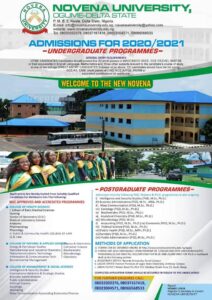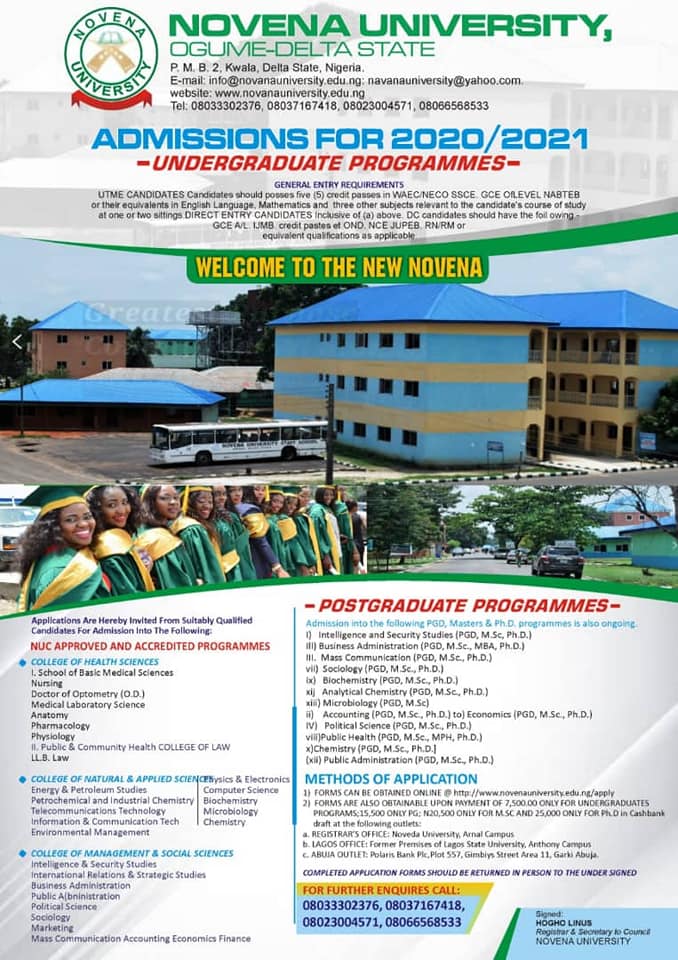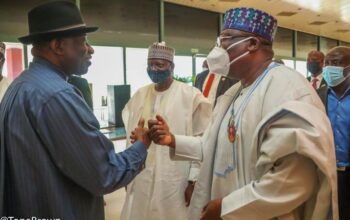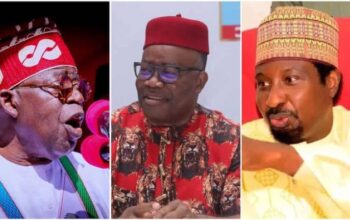EMAIL PUBLISHER: henryebi@yahoo.com
Call publisher: 08036977194
…………………………………………………………………………………..

Operatives of the Lagos Zonal Command of the Economic and Financial Crimes Commission, EFCC, have re-arrested a convicted Italian, Floriana De-Stefani, for failing to obey a court order upon her conviction by Justice Mojisola Dada of the Special Offences Court sitting in Ikeja, Lagos.
The judge had, on October 7, 2022, found De-Stefani guilty of using false documents and counterfeit seals to confer on herself ownership of a property belonging to a company, Waterside Properties Limited, an offence contrary to Section 366 of the Criminal Law of Lagos State.
Delivering judgment, Justice Dada had sentenced the convict to three years in prison and also ordered the release of the property on 14 A&B Warring Road (formerly Bayo Kuku Road), Ikoyi, Lagos to Waterside Properties Limited within three weeks.
De-Stefani was, however, re-arrested on Tuesday, December 19, 2023, for refusing to vacate the property ordered for release to the company by the court.
Following her arrest on Tuesday, she was also issued a notice by the Commission to vacate the property within seven days or risk legal actions.
De-Stefani, alongside Stella Ndubusi Ogboju, was first arraigned on March 30, 2019, on five-count charges bordering on forgery and stealing of a property belonging to a company, Waterside Properties Limited. The charges were later amended by the prosecution counsel, Ahmed Yerima, to six-count charges.
One of the amended charges read: “That you, Floriana De-Stefani, sometime in 2015, within the Ikeja judicial Division of this Honourable court, dishonestly converted for your own use a property known and situated at No.14A/B Warring Road, Ikoyi, Lagos, a property of Waterside Properties Limited.”
Media & Publicity
December 22, 2023
COURT JAILS IBRAHIM ABDULLAHI FOR FRAUDULENTLY SWAPPING AUTOMATED TELLER MACHINE, ATM, CARD
Justice M.A Shambu of Bauchi State High Court, sitting in Bauchi on Thursday, December 14, 2023 convicted and sentenced one Ibrahim Abdullahi to one year imprisonment for stealing the sum of N30,000( Thirty Thousand Naira only) through fraudulent swapping of an Automated Teller Machine, ATM, card.
Abdullahi was arraigned on two-count charges of stealing by the Gombe Zonal Command of the Economic and Financial Crimes Commission, EFCC.
One of the charge reads: “That you Ibrahim Abdullahi, sometime in September, 2023 or thereabout at Bauchi, Bauchi State, within the jurisdiction of this honorable court, committed theft of N30,000.00 (Thirty Thousand Naira) by taking it out of the possession of Zainab Usman, through the use of her UBA ATM card contrary the Section 287 of the Penal Code Law.”
He pleaded guilty to the charges, prompting the EFCC counsel, A.B. Kware to pray the court to convict and sentence him accordingly, while his counsel, Jamilu Salihu pleaded with the court to temper justice with mercy as his client he said, was a first- time offender who has promised to turn a new leaf.
Justice Shambu convicted and sentenced Abdullahi to one year imprisonment or to pay a fine of N20,000 (Twenty Thousand Naira) and restitute the sum of N30,000 to his victim.
Abdullahi’s journey to the Correctional Centre began when a petitioner alleged that on November 22 , 2023 she got a debit alert of N30,000 from her UBA account, having earlier in the day, gone to the bank to make a withdrawal where she met the convict, who offered to assist her operate the ATM. Upon releasing her card to him, he slotted it in the machine and claimed the transaction was “unsuccessful” and returned the card to her. However, shortly after she got home, she got a debit alert of N30, 000 and also discovered that the card Abdullahi returned to her was not hers.
Upon arrest and interrogation, Abdullahi confessed that he relocated from Kano State to Bauchi State to engage in ATM card swapping to raise money for his planned wedding. He further revealed that he perfected the swapping act, all by himself; adding that the five different ATM cards found in his possession belonged to his victims.
Media & Publicity
December 22, 2023
The many silver linings of Tinubu’s 7 months in office
By Bayo Onanuga
The removal of fuel subsidy and the move to merge foreign exchange rates, two headline reforms introduced by the Tinubu administration since late May, triggered problems such as high fuel prices and the depreciation of the Naira, two monstrosities which combined to cause a general spike in costs of services and goods.
Today, many Nigerians complain of a rise in the cost of living.
According to the latest NBS report, Nigeria’s inflation, which rose to 26.7 percent in September, again rose to 28.2% in November from 27.33% in October. Food Inflation remains untamed, rising from 31.52% in October to 32.84% in November 2023.
To compound the economic problems, few multinational companies such as GlaxoSmithKline, Procter & Gamble have announced their exit from our country, complaining about the difficult operating environment and the scarcity of dollar.
The truth is that the new policies alone are not solely responsible for the economic problems we are facing today. We were destined for the tough and rough patch, where we are today because of the prevailing conditions before Tinubu took over on 29 May.
As at June 2023, budget deficit was N10.8 trillion. Actual Debt service was 98.95 percent of revenue, far higher than the projected 59.37 percent. Inflow into the country’s foreign reserve came in trickles. And so bad was the state of affairs that Nigeria could not remit about $800 million fund of foreign airlines. JP Morgan exposed our near insolvency by claiming in a report that our net foreign reserve was just about $3.7 billion, not the $33 billion plus flaunted by Emefiele’s CBN.
President Tinubu, who promised during the campaign to take hard and difficult decisions, moved to tackle the economic problems from Day One, by first dispensing with the wasteful fuel subsidy that was billed to consume about N7trillion this year, five times more than what was provisioned for capital spending.
President Tinubu is quite aware of the side effects of his move to reset our economy. Though his administration has earned plaudits from the World Bank, the IMF and rating agencies such as Moody’s and Fitch, he is not carried away by the praises.
He is focussed on turning the economy round for growth, development and prosperity.
The moves are yielding some good effects. Amidst what some sections of the media perceive as general gloom, some silver linings are emerging, signposting that with a little more patience, our material conditions will improve and inflation will be tamed. For businesses, operating conditions will also improve.
In its third quarter report for the year, the NBS reported that GDP grew by 2.54percent. In a similar period in 2022, GDP recorded a growth of 2.25%. To demonstrate that the sun may be shining on us again, the 2.54% GDP growth recorded in Q3, was also higher than the 2.51% recorded in Q2.
The service sector, made up of information and communication, financial and insurance, was responsible for the growth witnessed in Q3. It had a 3.99% growth, contributing 52.7% of the aggregate GDP. The agriculture sector declined from 1.34% growth in Q2 to 1.3percent in Q3.
Growth was also recorded in construction and real estate, metal ores(69.76%), coal mining(58.03%), chemical and pharmaceutical products(6.77%), Cement(4.2%) and construction(3.89%). Oil reported a negative growth of 0.85%, a major improvement to the negative 22.67% recorded at the same period last year. It was -13.43 in Q2 of 2022. The improvement in the oil sector and its contribution to GDP has been attributed to the improvement in the security of oil infrastructure and operations, leading to increased production. Going forward in this Q4 and 2024, the NNPC Limited is confident that the sector will continue to climb the curve.
In the same Q3, according to NBS, the Industrial sector grew by 0.46%, an uptick compared with Q3 2022, when it had a negative 8% growth, even in the era of P&G and GSK exit.
An interesting revelation in the NBS Q3 report was the big jump in the volume of trade, from N12.16 trillion in Q2 to N18.8 trillion. Trade volume in the same period in 2022 was N12.28 trillion. We also recorded a trade surplus of N1.89trillion in Q3, an increase from the N708.8 billion in Q2 2023. In Q3 in 2022, we recorded trade deficit of N409.39 billion.
Value of exports in the third quarter was N10.35 trillion, far higher by 60.78 percent than the N6.44 trillion posted in Q2 2023. Crude oil dominated the export, accounting for 82.5 percent, a confirmation that our country is pumping out more oil for export unlike the previous years.
Just as our exports increased, imports also increased, rising from N5.73 trillion in Q2 2023 to N8.46 trillion in Q3, a rise of 60.8 percent. The imports recorded in the quarter was also higher in value compared to Q3 2022, which was N6.34 trillion.
As the Minister of Budget and National Planning, Atiku Bagudu noted in a recent report, economic prosperity in our country will be achieved with the reforms being implemented, supported by strong monetary and fiscal policies, food supply management and other intervention programmes.
President Tinubu who has never shied away from acknowledging the temporary pains triggered by the reforms, gave an assurance in a recent newspaper interview that his Administration will continue to take proactive measures to wrestle with the problems. Many of these measures are already being taken and in the New Year, we expect the silver linings, that are at present understated, to blossom into rays of sunshine to be experienced by all Nigerians.
*Onanuga is the special adviser Information and strategy to President Bola Tinubu
STATE HOUSE PRESS RELEASE
CHRISTMAS HOLIDAY: PRESIDENT TINUBU ASSURES NIGERIANS THAT HE WILL ALWAYS BE FAIR TO ALL
President Bola Tinubu says he will always be fair to all Nigerians and that his administration remains committed to advancing the unity of Nigeria, as well as ensuring the welfare and prosperity of all citizens.
Speaking at the Ansar-Ud-Deen Central Mosque in Surulere, Lagos, on Friday, the President said the economic reforms initiated by his government are aimed at establishing a robust and secure foundation for Nigerians today and for generations unborn.
President Tinubu, who joined the Muslim Ummah to observe Jumaat prayers marking the centennial anniversary of the Ansar-Ud-Deen Society of Nigeria (ADS), commended the Society for its service to humanity, contributions to the propagation of the tenets of Islam, and efforts in uplifting the downtrodden.
He implored members of the Society to remain committed to their objectives of advancing the education of citizens, as well as promoting the moral and social development of the Muslim Ummah.
The President thanked the Ansar-Ud-Deen Society for their support during the elections, emphasizing that their efforts serve as a motivation for his government to stay resolute in delivering good governance to the people.
”I thank the Ansar-Ud-Deen Society for its support during the elections. I do not take it for granted; rather, the support serves as a stimulus for us in government to remain focused,” he said.
Reiterating his commitment to the welfare of all citizens, President Tinubu, who is on a brief Christmas holiday in Lagos, said the recent 50 percent cut in inter-state land transportation fares nationwide, and the payment of N-Power beneficiaries’ backlog of allowances, among other reliefs, are all efforts aimed at alleviating the burden of Nigerians this festive season with much more to be expected in the new year.
”We are committed to enthroning a better society for our citizens irrespective of ethnic, religious, or geographical differences. The various policies already in place are expected to bring great succour to our people. We know their pains, and we are addressing them holistically.
”It is instructive that Ansar-Ud-Deen has attained 100 years through a systemic strategy that maintains its mission and vision. This is a testimony to what focused planning can achieve in a society,” the President concluded.
Chief Ajuri Ngelale
Special Adviser to the President
(Media & Publicity)
December 22, 2023
SERAP sues NNPC over failure to account for Nigeria’s daily oil production, revenues
Socio-Economic Rights and Accountability Project (SERAP) has filed a lawsuit against the Nigerian National Petroleum Company (NNPC) Limited over the “failure to disclose details of Nigeria’s daily oil production, exportation and the total amounts of revenues generated from oil since the removal of subsidy on petrol in May 2023.”
Former Governor of the Central Bank of Nigeria (CBN), Sanusi Lamido Sanusi, had recently alleged that “the NNPCL is failing to remit enough foreign exchange into the treasury despite the removal of fuel subsidy,” asking: “Where is the money?”.
In the suit number FHC/ABJ/CS/1719/2023 filed last Friday at the Federal High Court in Abuja, SERAP is seeking: “an order of mandamus to direct and compel the NNPC to disclose details of barrels of oil Nigeria produces and exports daily and the total amounts of revenues generated since the removal of subsidy on petrol.”
SERAP is seeking: “an order of mandamus to compel the NNPC to disclose how much of the revenues generated from the production and exportation of oil have been remitted to the public treasury since the removal of subsidy on petrol.”
SERAP is also seeking: “an order of mandamus to direct and compel the NNPC to disclose details of payment of 11 Trillion Naira made as subsidy payments from 1999 to May 2023, including a detailed breakdown of the payments made.”
In the suit, SERAP is arguing that: “There is a legitimate public interest in disclosing the information sought. The NNPC has a legal responsibility to disclose the details of Nigeria’s daily oil production, exportation and the revenues generated and remitted.”
SERAP is also arguing that, “Nigerians have the right to know the amounts of barrels of oil the country produces and exports daily, the revenues generated and remitted to the public treasury.” Compelling the NNPC to disclose these details would promote transparency and accountability in the oil sector.”
According to SERAP, “The failure by the NNPC to disclose the information sought is a grave violation of the provisions of the Nigerian Constitution 1999 [as amended], the Freedom of Information Act, and the country’s obligations under the African Charter on Human and Peoples’ Rights.”
SERAP is arguing that, “Transparency would ensure that the revenues generated from Nigeria’s daily oil production and exportation are not diverted into private pockets, and increase public confidence that the revenues would be used to benefit Nigerians.”
The suit filed on behalf of SERAP by its lawyers, Kolawole Oluwadare and Andrew Nwankwo, read in part: “Nigeria’s daily oil production, exportation and the revenues generated have been mostly shrouded in secrecy.”
“Disclosing the amounts of barrels of oil the country produces and exports daily, the revenues generated and remitted to the public treasury would also ensure that the NNPC operates within the law.”
“Transparency and accountability in the amounts of barrels of oil the country produces and exports daily, the revenues generated and remitted to the public treasury would improve the enjoyment by Nigerians of their right to natural wealth and resources.”
“The public interest in publishing the information sought outweighs any considerations to withhold the information.”
“Despite the country’s enormous oil wealth, ordinary Nigerians have derived very little benefit from oil money primarily because of widespread grand corruption, and the culture of impunity of perpetrators.”
“Combating the corruption epidemic in the oil sector would alleviate poverty, improve access of Nigerians to basic public goods and services, and enhance the ability of the government to meet its human rights and anti-corruption obligations.”
“Section 15(5) of the Nigerian Constitution 1999 (as amended) requires public institutions and officials to abolish all corrupt practices and abuse of power. Section 16(2) of the Nigerian Constitution further provides that, ‘the material resources of the nation are harnessed and distributed to serve the common good.’”
“Section 13 of the Nigerian Constitution 1999 imposes clear responsibility on the NNPCL to conform to, observe and apply the provisions of Chapter 2 of the constitution.”
“Nigeria has made legally binding commitments under the UN Convention against Corruption and the African Union Convention on Preventing and Combating Corruption to ensure transparency and accountability in the management of public resources.”
“Articles 5 and 9 of the UN Convention against Corruption also impose legal obligations on the NNPCL to ensure proper management of public affairs and public funds. These commitments ought to be fully upheld and respected.”
“Nigerians are entitled to the right to receive information without any interference or distortion, and the enjoyment of this right should be based on the principle of maximum disclosure, and a presumption that all information is accessible subject only to a narrow system of exceptions.”
“By Section 1 (1) of the Freedom of Information (FoI) Act 2011, SERAP is entitled as of right to request for or gain access to information, including information on the details of barrels of oil Nigeria produces and exports every day and the total amounts of revenues generated and remitted to the public treasury.”
“The Freedom of Information Act, Section 39 of the Nigerian Constitution, and article 9 of the African Charter on Human and Peoples’ Rights guarantee to everyone the right to information, including the details of Nigeria’s daily oil production, exportation and the total amounts of revenues generated and remitted to the public treasury.”
“By the combined reading of the provisions of the Nigerian Constitution, the Freedom of Information Act and the African Charter on Human and Peoples’ Rights, there are transparency obligations imposed on the NNPCL to publish the details sought.”
“The Nigerian Constitution, Freedom of Information Act, and the country’s anti-corruption and human rights obligations rest on the principle that citizens should have access to information regarding their public institutions’ activities.”
“The NNPCL has failed to disclose the amounts of barrels of oil the country produces and exports. The NNPCL has also reportedly failed to publish details of revenues generated from the production and exportation of oil and the amounts of revenues remitted to the public treasury as required by Nigerian laws.”
“According to the former Governor of the Central Bank of Nigeria (CBN), Sanusi Lamido Sanusi, ‘It is only the NNPCL that can give the figures about how much oil we produce daily, how much we sell, and where the money is going. We are no longer paying subsidies so where are the dollars? Where is the money?’”
“The NNPCL has a legal responsibility to promote transparency and accountability in the country’s daily oil production, exportation and the revenues generated and remitted to the public treasury. The NNPLC also has a legal responsibility to disclose details of payment of N11 trillion subsidy.”
No date has been fixed for the hearing of the suit.
Kolawole Oluwadare
SERAP Deputy Director
24/12/2023
Lagos, Nigeria
Emails: info@serap-nigeria.org; news@serap-nigeria.org
Twitter: @SERAPNigeria
Website: www.serap-nigeria.org
For more information or to request an interview, please contact us on: +2348160537202



